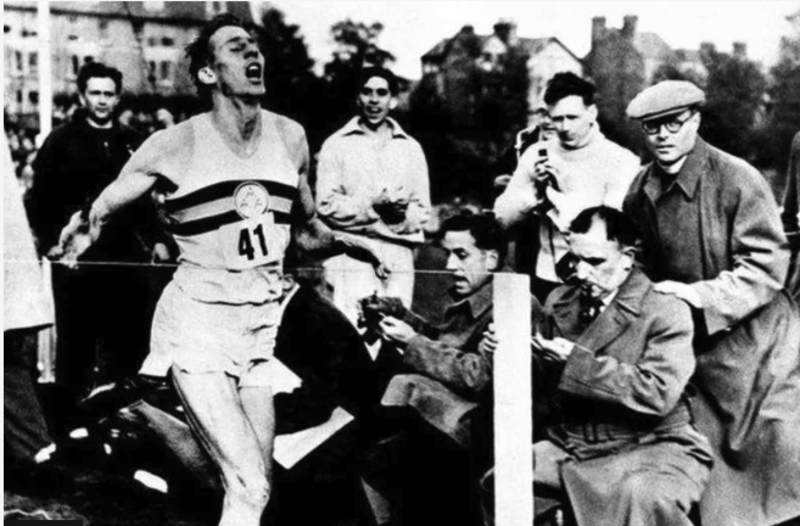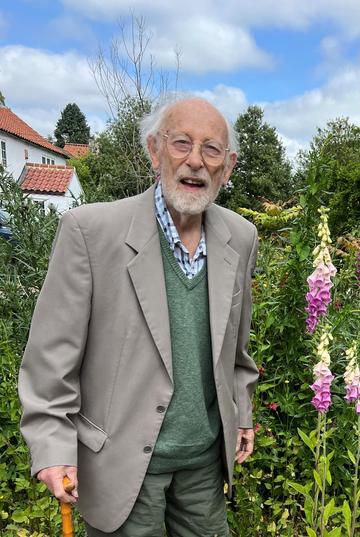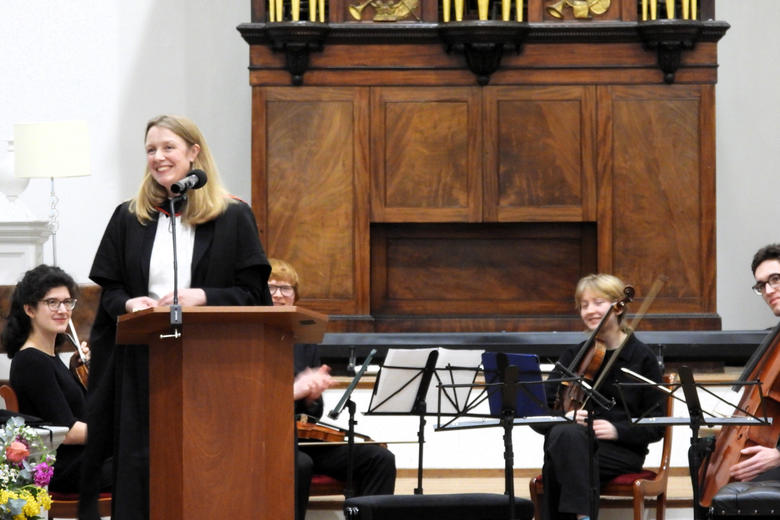70 YEARS SINCE BANNISTER'S SUB-FOUR MINUTE MILE

70 YEARS SINCE BANNISTER'S SUB-FOUR MINUTE MILE
On this day in 1954, an evening fixture was held at the Iffley running track in Oxford, and the result transfixed the world.
Published: 6 May 2024
Author: Roger Shakeshaft
Share this article
Thursday 6 May 1954. 5–7pm. Roger Bannister and the Four Minute Mile.

'Who’s coming to see an attempt at the Four Minute Mile?' is the cry from Front Quads at half past four on a chilly afternoon in May. There is an Athletics fixture this evening at the Iffley Road Track and Roger Bannister is on the programme. For the last four years, this has been the knee jerk reaction from the general public, even if he is down for the half-mile on the card!
This is not the only sporting attraction at the beginning of the Oxford Hillary term. Earlier that day Brian and I were at The Parks, for an hour, where Yorkshire had opened their season with a match against the University. They had sent a strong team which included Hutton, Illingworth and Truman. The match is into the second day; Yorkshire have declared at 293 for 4 and Freddy Truman is in the process of demolishing the home side’s batsmen with the aim of securing an innings defeat. An inauspicious start for the new captain, M.C.Cowdrey, who was out for a duck.
It was a good time to be up at Oxford. Approaching my 21st birthday, I had finished National Service and was in my third term at Lincoln College reading Mathematics. The War was nearly ten years ago, austerity was behind us and Rationing had just ended. Financially, it was a comfortable time for students; I did not have to pay a penny for tuition, board or lodging for the three years I was up, and there was a small amount for the vacations. This was met by the Local Authority to whom my parents paid their rates. It was a frivolous time when, if you were fortunate enough to have a hard consonant in your name, the suffix ‘..ers’ could be added, and you were made! Hence: Banners, Chatters, McWhirters, Shakers etc.
The evening’s fixture, traditionally, marks the beginning of the Athletics season in which Oxford plays host to the collective British Athletic talent (the AAA). It is, of course, an unequal match, but in a busy year of international competitions here was a chance to study the talent - no one is complaining. Billed as an evening event from 5pm to 7pm, it is, in student terms, conveniently placed between tea and dinner. And for colleges in the Turl, tea means Brown’s Tea Room with Dripping Toast in the Covered Market. As far as the Four Minute Mile is concerned, we have been here before; we address the next two hours with a mixture of apprehension and anticipation. Gunder Haegg’s 1945 record of 4m: 1.4sec still stands.
It is a short cycle ride to the ground on Iffley Road. At the gate a small queue has formed. I part with sixpence (equivalent to £1 today) for a programme, but as far as I can remember entrance was free. Brian and I elect to sit on a raised knoll on the north side above the second bend of the track, which is sited on the basin of the River Cherwell. The first thing we notice is a rostrum camera, in the centre of the track, set up by the BBC, earlier that day. Looking back, over the decades, we are grateful for the footage which it delivered, to add veracity to remembered accounts of how the race unfolded.
We turn to the programme, and there it is: 6pm. Event Nine. One Mile. And on the card, for the visitors: Bannister, Chataway, Brasher; three men of International stature. But what interested me more was the inclusion of T.N.Miller as a late insertion for the home team, to bring their number up to three. Nigel Miller was a contemporary of mine at school (same boarding house, actually). Nigel is more surprised than me when he buys his programme at the gate – this is the first he had known about it – his late notification never reached him via the unsatisfactory college postal system. He was unable to find suitable kit to wear and his name is scratched from the card, we are informed, over the Tannoy speakers.
What do I remember of the crowd, besides the absence of mobile phones? There is, naturally, a strong undergraduate presence, but any local Athletics club within a 50-mile radius would be eager to have a presence here. Competitors wore baggy track suits in black or dark blue; spectators are dressed drably, by today’s standards, mainly white men and each one would be wearing a tie; as for the size of the crowd – no official measure was taken – my guess, for what it’s worth - closer to a thousand than to two thousand. With the weather, one can be more accurate. My copy of the Oxford Mail registered one-tenth of an inch rainfall that day; this was likely to have been late in the morning. When Bannister’s party visited the track before lunch, they were far from optimistic. With the benefit of hindsight, we can say that as the day wore on the weather improved, though not quickly enough for the London reporters who, with their photographers, returned to the capital mid-afternoon. The problem was the wind; College scarves, which did add a bit of colour, were very much in evidence as we sat down.
We were not to know, but Bannister was adamant that an attempt on the record was off, unless the wind abates substantially, whatever the crowd thought or wished for. Behind me, across the Iffley Road is the Church of St John the Evangelist. From its tower flies the flag of St George. It was raised two days earlier, on a minor Saints Day commemorating the English Protestant Martyrs of the Reformation. We are reminded of a visit to Oxford, four hundred years ago, of three other Englishmen for whom the weather was the least of their concerns. A brisk west wind provides a horizontal attitude to the flag.
Meanwhile, for the spectators, today, there is a full programme of sixteen events to watch. The home side takes its first victory when Ian Boyd wins in the half mile. Boyd will be in the finals, later that year, with Bannister at Vancouver and Berne. The evening’s fixture could easily be justified by Mike Pharaoh’s achievement of a British Empire Record in the Discus: a very satisfactory start to the season for him.
Far from satisfied, though, is the Bannister team. Two rival milers, John Landy and Wesley Santee from Australia and USA respectively have key races in the coming weeks; they will be waiting for news from Oxford. All three men have run miles in under 4min 3sec in 1953. Today is a golden opportunity - if only the wind would drop. At five to six St George’s Standard conveniently drooped, indicating a lull in the wind. A nod from Bannister. The game is on!
The watchers are spared this drama at the track side; we were here to enjoy ourselves. Six o’clock, on the dot – bang! Brasher jumps the gun – false start – come back – there’s a tension in the air, and the crowd senses it. Now we’re off. The team have a simple plan: try to run an even race of four 60 second laps; Brasher to pace for two laps, Chataway to take the third, leaving Bannister to tackle the fourth alone. In training he has run a three-quarter mile in three minutes, or less, on many occasions – keep it simple!
Bannister is cosseted between Brasher and Chataway as they enter the first lap. Bannister is heard to shout “too slow” in the back straight – so much for a simple plan! - looks fast enough for us as they troop past for the first time, and so it is ; “57.5” calls the timekeeper at the quarter. Now, this can mean two things: you’ll pay for this later, or nice to get a couple of seconds under your belt early on. The crowd considers this dilemma, audibly, and begins to have a life of its own. The three men pass us a second time; Brasher looks grimmer, while the two paced men look relaxed.
“One minute, fifty-eight point two” calls the timekeeper at the half-mile. The crowd is whipped up to a roar similar to the antics of a murmuring of imaginary starlings – “This looks good” it says. Brasher has, indeed, done a good job. But his responsibility is not over; he must run at this pace, however exhausted he feels. The transfer of care is a delight to watch on the BBC footage. At the start of the first bend, Chataway moves out to pass the two men in front; Bannister follows him and slips into the gap ahead of Brasher; like a baton change in a relay, there is no diminution of speed. Brasher is free to finish the race at his own pace (but he must finish properly). The crowd recognises this as a serious commitment and the noise is ratchetted up. We observe the strain on Chataway’s face as he sweeps past us for the third time, Bannister is relaxed since he has not had to make any decisions so far.
At the bell, the timekeeper calls out “Three minutes and half a second. This changes everything; for a moment the world stands still! – could this be it, after all the waiting years? Everyone is on his feet and waving – nothing can go wrong now. Chataway must push on at this pace, he has had the benefit of two laps’ pacing, nevertheless he is close to his limit.
Bannister makes his strike at the end of the first bend; as he leans in, he finds an extra thrust from his spikes to shoot past Chataway. He knows what to do and he knows he has the capability. We in the crowd are also well informed. Our excitement can best be described by comparison with a punter at the Derby. We have money on the odds-on favourite and in the last furlong he is a nose ahead of relentless pursuer. For us, this adversary is the reflected sweep of a watch’s second-hand breathing down his neck like a narrow sword in the hand of the “Grim Reaper.” “Keep going, keep going” we shout. We see a confident runner passing from left to right in front of us. As he approaches the tape, he knows the time is close to four minutes, we know, everyone knows! He breasts the tape in full flow, collapsing into the arms of friends. His fate now lies in the uncoiling of a spring in the fists of a handful of middle-aged men in trilby hats (Don’t mention the pipe!
Norris McWhirter, a good friend, who trains with Bannister is in the process of compiling the first edition of the Guinness Book of Records. He is on hand, that evening, because he is running anchor in the last event, the sprint relay. He has made an arrangement with the Clerk of the Course, that if the result is favourable, he would like to make the announcement. There is a pause while the necessary paperwork is done; a nod from the chief timekeeper as one of these pieces of paper is handed over to McWhirter. The obligatory crackle emerges from the Tannoy before he embarks on his prepared speech, deliberately spun out for maximum effect. Most of it went over our heads, which explains why there were, and still are, many versions, whenever folk tried to recall the sequence. When it was time for the Time, all he could deliver was “three”. The crowd, deliriously happy, drowned the rest of his speech out.
I have had time to reflect on the collective feeling we, as spectators, felt that evening. The semi-religious word rapture, early on, appealed to me. But over the years I have settled on a more trivial description. We felt like ‘the cat that ate the canary’. We experienced something we were not fully entitled to, but we were darned if anyone attempted to take it away from us. It is similar to that of the late Queen - Princess Elizabeth, as she then was, - on VE day. She slipped out of the Palace with friends to mingle with the crowd, to stand at the gates and call: “We want the King”. A fortuitous moment in British history, which can never be repeated.
There are seven more events on the programme; we have come for an Athletics meeting, whatever else has happened. The outstanding runner from the home team is Derek Johnson of Lincoln. On a good day he could give anyone a run for his money from 100yards up to five miles. Tonight at 6.20 he takes the 220 in 22.4 secs. Half an hour later he wins the 440 in 48.0 secs which is a ground record and only a tenth of a second outside the English Native Record. He was the 880yds Gold Medal winner at the Empire Games later in the year and went on to collect Silver in the 800m at the Melbourne Olympics in 1956. Other athletes, as well as Bannister, present that evening would perform or excel on the world’s stage – we name Chataway, Brasher and Ian Boyd.
Altogether a very satisfactory sporting evening, involving twelve men of International standard and, along the way, twelve records were established. We cycle back briskly to college. There’s time for a swift half in Deep Hall before the second sitting of dinner, at which we bore the pants off anyone who is prepared to listen, rehearsing a tale which will be related long into the Twenty-first Century.
Dedicated to the memory of Brian Charles Southam. (d. 2010)
©Roger Shakeshaft. Normanton-on-Trent, January 2024
We last spoke to the late Sir Roger Bannister in 2017 and he spoke eloquently about his own memory of running the world's first sub-four minute mile. The recording of that is HERE.
Roger Shakeshaft (Lincoln, 1953) (Pictured in the main text, from 2023). Roger attended the Four-Minute Mile celebrations held at Merton College on Sunday 5 May, and meanwhile a Community Mile open to the whole community of the city was stages today, 6 May, in Oxford city centre just days after the regular celebration of May Morning. An exciting time for Town and Gown alike.
'Born 1933 and educated at Shrewsbury School which takes Cross Country Running very seriously. I was not much use at conventional games but did enjoy running with only modest success, making the school's second team. My academic skill was in Mathematics. After two years’ National Service I came to Lincoln College, matriculating in 1953, reading for a degree in Mathematics. In the three years no one in college read Maths, so I never indulged in talking shop. However, at that time Lincoln was strong in Athletics and Running – we won the Cross Country Cuppers in ’53 and ’54. A contemporary of mine was Derek Johnson. On that evening in May he won both 220yds and 440yds. Later that year he took Gold at the Empire Games in Vancouver, in a record time in the Half Mile; at the 1956 Melbourne Olympics it was Silver in the 800m. Heady times indeed. I was part of a group at the Iffley Road that evening.















